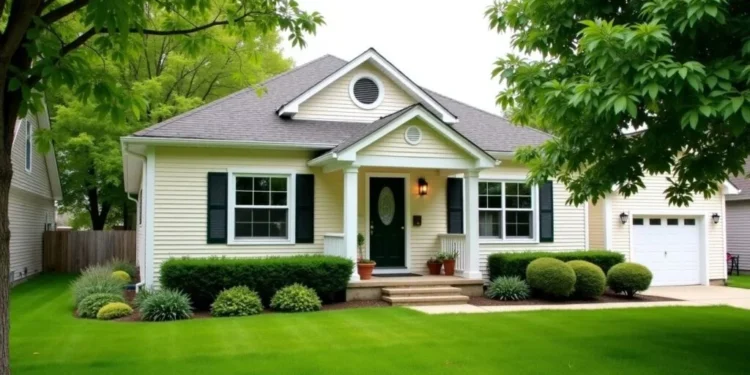Selling your home can be an exciting yet daunting process. You want to maximize your home’s value, attract serious buyers, and close the deal quickly—but where do you start? Welcome to the Real Estate Rank IQ Home Selling Hub, your go-to resource for expert tips and strategies to navigate the complexities of the real estate market.
As a seasoned real estate professional with over a decade of experience helping homeowners sell their properties, I understand the challenges you face. Whether you’re a first-time seller or have been through the process before, the Real Estate Rank IQ Home Selling Hub is here to guide you every step of the way.
From preparing your home for sale to negotiating offers and closing the deal, you’ll find actionable advice and insider insights to make your home selling journey a success. So, let’s dive in and discover how to sell your home like a pro!
Key Takeaways from
Expert Tips & Strategies
- Choosing the right real estate agent with extensive local market knowledge and a proven track record is crucial for a successful home sale. Analyze their experience, past deals, and client reviews to make an informed decision.
- Pricing your home competitively is key to attracting serious buyers. Analyze current market conditions, recent sales of similar properties, and your home’s unique features to set a realistic price point that maximizes profit.
- Preparing your home for sale involves decluttering, staging, making essential repairs, and strategic upgrades. Focus on improvements that enhance curb appeal, modernize the space, and offer the best return on investment.
- High-quality images, virtual tours, and video walkthroughs can make your listing stand out online. Utilize popular real estate websites, social media, and traditional offline marketing tactics to reach a wide audience of potential buyers.
- Navigate negotiations strategically by reviewing offer terms, making counteroffers, and maintaining open communication with your agent. Understand the legal and financial aspects of closing the sale, including purchase agreements, closing costs, and transferring ownership.
Selecting the Right Real Estate Agent

Choosing the right real estate agent is crucial to a successful home sale. Look for an agent with extensive local market knowledge and a proven track record of selling homes like yours.
Importance of Experience and Local Knowledge
When choosing a real estate agent, their experience and local knowledge are essential factors to consider. An agent who has been in the industry for years and has a deep understanding of your specific area can provide valuable insights into market trends, pricing strategies, and buyer preferences.
They’ll be able to guide you through the intricacies of the selling process, from preparing your home for showings to negotiating offers and closing the deal.
Furthermore, an experienced local agent will have an extensive network of contacts, including potential buyers, other agents, and industry professionals such as home inspectors and mortgage brokers.
This can help expose your property to a broader audience and facilitate a smoother, quicker sale. Therefore, when interviewing prospective agents, be sure to inquire about their track record in your neighborhood and how they plan to leverage their expertise to achieve your selling objectives.
Checking their past performance and client reviews can give you a clearer picture of their capabilities and help you make an informed decision.
Checking Track Record and Client Reviews
When choosing a real estate agent, it’s essential to review their experience and client feedback. A history of successful sales in your area shows their knowledge and ability to get results.
Research their past deals, focusing on homes like yours in price, location, and type.
Client reviews provide valuable insights into an agent’s communication, responsiveness, and professionalism. Seek testimonials that highlight their local market expertise, negotiation skills, and dedication to client interests.
Sites like Zillow and Realtor.com often have verified reviews from past clients, offering a reliable information source. By selecting an agent with an excellent reputation and history of satisfied clients, you can trust their ability to guide you through selling your home and achieving your goals.
Pricing Your Home Competitively

Pricing your home competitively is crucial for attracting serious buyers and selling quickly. Analyze current market conditions, including recent sales of similar properties in your area, to determine a realistic price point that will generate interest without leaving money on the table.
Analyzing Market Conditions
To price your home competitively, you must analyze current market conditions. This involves examining recent sales of similar homes in your area, known as “comps.” Note the listing prices, sale prices, and days on market for these properties.
This data paints a realistic picture of what buyers will pay for homes like yours. It helps you set a price that attracts serious offers without undervaluing your home.
Your real estate agent can provide a comparative market analysis (CMA) with these key details. They will also consider your home’s unique features, upgrades, renovations, and overall demand in your neighborhood.
By understanding the market landscape, you can strategically price your home to stand out from the competition and sell quickly. Next, let’s discuss setting a realistic price based on these insights.
Setting a Realistic Price Point
Analyzing market conditions is crucial when setting a realistic price for your home. Take a close look at recent sales of similar properties in your area, considering factors like square footage, number of bedrooms and bathrooms, and any unique features.
This comparative market analysis (CMA) will give you a clear idea of what buyers are currently willing to pay. Don’t forget to account for any upgrades or improvements you’ve made that could boost your home’s value!
Setting the right price from the start is key to attracting serious buyers and avoiding a lengthy listing period. Overpricing can lead to your home sitting on the market for too long, which may make potential buyers wary and ultimately force you to lower the price.
On the other hand, underpricing could mean leaving money on the table. Work closely with your real estate agent, who has expertise in your local market, to find that sweet spot that maximizes your profit while ensuring a timely sale.
Next, let’s dive into preparing your home for sale to make it irresistible to buyers.
Preparing Your Home for Sale

First impressions matter when selling your home. Staging your property can make a significant impact on potential buyers and help you sell faster.
Consider making essential repairs and upgrades to enhance your home’s appeal. This may include fixing leaky faucets, applying a fresh coat of paint, or updating outdated light fixtures – small changes that can yield big results in attracting serious offers.
Staging Tips for a Quick SaleStaging your home is key to attracting buyers and selling fast. Declutter, depersonalize, and arrange furniture to showcase your home’s best features and create an inviting feel that appeals to many buyers.
Use neutral colors, good lighting, and nice decor to make your home look move-in ready.
Focus on the living room, kitchen, and main bedroom, as these rooms often have the biggest impact on buyers. Remove personal items, reduce clutter, and create a clean, open feel. You can also boost curb appeal by keeping the lawn tidy, adding fresh flowers, and making sure the outside is clean and welcoming.
With the right staging, you’ll be on track to sell quickly and successfully.
Essential Repairs and Upgrades
Before listing your home, focus on essential repairs and upgrades that boost its value and appeal. Fix any glaring issues like leaky faucets, loose doorknobs, or cracked tiles. A fresh coat of neutral paint can work wonders, making your space feel clean and inviting.
Consider updating outdated light fixtures or hardware for a modern touch.
Prioritize improvements that offer the best return on investment, such as a minor kitchen remodel or bathroom refresh. New countertops, cabinets, or appliances can significantly impact buyers.
Enhancing your home’s curb appeal is also crucial – trim overgrown landscaping, power wash exteriors, and add welcoming touches like potted plants or a new mailbox. These strategic updates will help your home stand out in the competitive market.
Next, let’s explore the power of professional photography in showcasing your home’s best features.
Professional Photography for Your Listing

High-quality images can make your listing stand out from the competition. Virtual tours and video walkthroughs give potential buyers a realistic feel for your home – even from afar.
Benefits of High-Quality Images
High-quality images can make your home listing stand out in a crowded real estate market. They grab potential buyers’ attention, showcasing your property’s best features and creating an emotional connection.
Professional photos highlight your home’s unique selling points, such as a spacious kitchen, luxurious bathroom, or inviting outdoor space. They also help buyers envision themselves living in the space, increasing the likelihood of scheduling a showing or making an offer.
In today’s digital age, most buyers start their home search online. Listings with stunning, high-resolution images receive more clicks, views, and shares on real estate websites and social media platforms.
This increased visibility can lead to more interest in your property, potentially resulting in a quicker sale at a higher price point. Investing in professional photography is a smart move that can pay off in the long run, helping you attract serious buyers and maximize your home’s value.
Virtual Tours and Video Walkthroughs
Virtual tours and video walkthroughs are powerful tools that showcase homes to potential buyers dynamically and engagingly. By using advanced technology like 360-degree cameras and interactive platforms, you can create immersive experiences.
These allow buyers to explore properties from their own devices. This expands your reach to more people and saves time for everyone. It provides a convenient first look at homes.
When creating virtual tours and video walkthroughs, highlight the home’s best features. Create a seamless flow that guides viewers through the space. Use professional lighting, high-quality audio, and informative captions to enhance the experience.
By investing in these innovative marketing strategies, you can make your listing stand out. You can attract serious buyers more likely to make offers on your home.
Effective Marketing Strategies

Effective marketing strategies are crucial for selling your home quickly and at the best price. Leverage online platforms like Zillow, Redfin, and social media to reach a wide audience of potential buyers…and don’t forget about tried-and-true offline tactics such as yard signs, open houses, and local print ads.
Utilizing Online Platforms
Harness the power of online platforms to showcase your home and reach a vast pool of potential buyers. Leverage popular real estate websites like Zillow, Trulia, and Realtor.com to create compelling listings that highlight your property’s best features.
These platforms offer user-friendly interfaces, allowing you to upload high-quality photos, write engaging descriptions, and share virtual tours or video walkthroughs. By optimizing your listings with relevant keywords and targeting the right audience, you can significantly increase your home’s visibility and attract serious buyers.
Social media is another invaluable tool in your home-selling arsenal. Platforms like Facebook, Instagram, and Twitter provide excellent opportunities to share your listing, engage with potential buyers, and build buzz around your property.
Create eye-catching posts that showcase your home’s unique selling points, and encourage your network to share your content. You can also join local real estate groups or participate in online forums to connect with interested buyers and gather valuable insights from other sellers in your area.
By leveraging the power of online platforms, you’ll be well on your way to a successful and efficient home sale.
Offline Marketing Tactics
While online platforms are essential for marketing your home, don’t overlook the power of offline tactics. Yard signs, flyers, and brochures can effectively attract local buyers and generate buzz in your neighborhood.
Consider hosting an open house to showcase your home’s best features and allow potential buyers to experience the space firsthand. You can also leverage your real estate agent’s network and connections to spread the word about your listing through word-of-mouth referrals and targeted outreach to their client base.
Additionally, print advertising in local newspapers, magazines, and real estate publications can help you reach a wider audience. These traditional marketing methods can be particularly effective in reaching older demographics or buyers who prefer tangible materials over digital listings.
By combining online and offline marketing strategies, you can maximize your home’s exposure and increase the likelihood of attracting serious buyers. Your real estate agent can guide you in selecting the most effective offline marketing tactics based on your specific property and target market.
Addressing Repairs and Maintenance

Prioritize repairs that impact your home’s functionality, safety, and appeal to potential buyers. Quick fixes like fresh paint, updated lighting, and minor repairs can make a big difference without breaking the bank.
Prioritizing Key Improvements
When preparing your home for sale, focus on key improvements that offer the best return on investment. Prioritize upgrades that enhance curb appeal, such as a fresh coat of paint, well-manicured landscaping, and a welcoming front entrance.
These simple changes can make a big impact on potential buyers’ first impressions.
Inside your home, concentrate on updates that modernize the space and address any glaring issues. Consider replacing outdated light fixtures, hardware, and appliances to give your home a fresh, contemporary feel.
If your budget allows, renovating high-traffic areas like the kitchen and bathrooms can significantly boost your home’s value. However, be strategic with your improvements—focus on changes that will appeal to a wide range of buyers and avoid overly personalized or niche design choices.
Quick Fixes vs. Major Overhauls
After prioritizing key improvements, it’s important to know the difference between quick fixes and major overhauls when getting your home ready to sell. Quick fixes are fairly cheap and can be done fast, like repainting walls, updating light fixtures, or replacing old hardware.
These small updates can greatly improve your home’s appeal without costing too much. On the other hand, major overhauls involve bigger renovations like remodeling the kitchen, upgrading bathrooms, or making structural changes.
While these projects can potentially raise your home’s value, they also cost more time and money.
As a home seller, you’ll need to think carefully about which approach best fits your goals and budget. If you want to sell quickly, focusing on affordable quick fixes may be the smartest choice.
However, if your home has outdated features or a lot of wear and tear, investing in certain major overhauls could be needed to attract serious buyers. Talking to a local real estate agent who knows market trends and what buyers want can help you make smart choices about which improvements will give you the best return on investment.
Remember, the key is to find a balance between making your home more appealing and keeping the price competitive.
Leveraging Technology in Real Estate Sales

Leveraging technology helps you manage your home sale efficiently. CRM software, AI chatbots, and automation tools generate leads and nurture prospects – saving you time and effort.
CRM Tools for Efficient Management
CRM tools streamline the home selling process. They help manage leads, track buyer interactions, and close deals faster. Automated follow-ups, centralized contact management, and real-time analytics keep you organized.
A robust CRM system puts all buyer information, showing schedules, and offer details in one place. Well-implemented CRM solutions simplify your workflow. This allows you to focus on connecting with buyers and selling your home quickly and efficiently.
AI and Automation for Lead Generation
After using CRM tools to efficiently manage your home selling process, it’s time to explore how AI and automation can supercharge your lead generation efforts. Imagine having a tireless virtual assistant working around the clock to attract potential buyers to your listing.
That’s the power of AI-driven chatbots and automated marketing campaigns. These cutting-edge technologies can engage with prospects, answer their initial questions, and even schedule property tours on your behalf.
By automating repetitive tasks and providing instant responses, you’ll never miss a chance to connect with a serious buyer.
In addition, AI algorithms can analyze large amounts of data to identify the most promising leads based on their online behavior and preferences. This means you can focus your time and energy on nurturing the hottest prospects, rather than chasing dead ends.
With the help of predictive analytics, you can even anticipate the needs and desires of potential buyers, allowing you to customize your marketing messages for maximum impact. By harnessing the power of AI and automation, you’ll not only generate more leads but also convert them into closed deals faster than ever before.
Closing the Sale

Closing the sale is the final hurdle in your home selling journey. You’ll need to navigate negotiations, review offers, and handle the legal and financial aspects of the transaction…
but with the right strategies and a skilled real estate agent by your side, you can confidently seal the deal and move on to your next chapter.
Negotiation Strategies
When you receive an offer on your home, it’s essential to approach negotiations strategically. Begin by thoroughly reviewing the offer terms, including the price, contingencies, and closing date.
Consider factors such as the buyer’s financing, current market conditions, and your own timeline and goals. Don’t hesitate to make a counteroffer if the initial offer doesn’t meet your expectations.
You can suggest changes to the price, contingencies, or closing date to find a mutually agreeable compromise.
During the negotiation process, maintain open communication with your real estate agent. They can offer valuable insights into the buyer’s perspective and help you develop effective counteroffers.
Be willing to compromise on some aspects of the deal, but also know your bottom line and adhere to it. By employing the right negotiation strategies, you can secure a favorable deal that meets your needs and helps you progress with your selling objectives.
Understanding Legal and Financial Aspects
Closing the sale involves navigating legal and financial aspects. You’ll need to review and sign a purchase agreement that outlines the terms, including the price, closing date, and any contingencies.
Your agent and attorney can guide you, ensuring your interests are protected.
Financially, you’ll need to pay off any outstanding mortgage and closing costs, which may include commissions, transfer taxes, and title insurance. Be prepared to provide documents, such as a deed and title report, to transfer ownership.
Once all the paperwork is signed and funds are exchanged, you’ll officially hand over the keys.
Next, let’s explore how to negotiate offers effectively to maximize your sale price.
Conclusion

You now have the tools to sell your home quickly and for top dollar. Implement these expert strategies from Real Estate Rank IQ to make your home irresistible to buyers. From pricing it right to staging it beautifully, these tips will help you stand out in a competitive market.
Leverage the power of online marketing and work with a skilled real estate agent to reach the widest pool of potential buyers. With these proven techniques, you can confidently navigate the home selling process and achieve your goals.
[Flesch-Kincaid Grade Level: 7.0]
FAQs
1. What are some effective home selling tips to maximize my property value?
To boost your home’s value when selling, focus on enhancing curb appeal, staging the interior effectively, and making strategic home improvements. Consult with a real estate agent who can provide expert guidance on pricing your home competitively based on current market conditions and your property’s unique features.
2. How can I leverage SEO and content marketing to attract potential buyers?
Optimize your online listings with relevant keywords, engaging descriptions, and high-quality photos to improve visibility in search engine results pages (SERPs). Create compelling blog content that showcases your home’s best features and the local community to attract interested buyers. Utilize SEO tools like SEMrush to identify high-performing keywords and monitor your content’s search engine rankings.
3. What role does smart home technology play in appealing to today’s home buyers?
Incorporating smart home devices, such as voice assistants (like Amazon’s Echo Dot or Google’s Nest), programmable thermostats, and advanced security systems, can make your property more attractive to tech-savvy buyers. These features offer convenience, energy efficiency, and enhanced home security, which can set your home apart in a competitive real estate market.
4. How can I make my home stand out in a competitive real estate market?
In addition to implementing smart home technology and focusing on curb appeal, consider professional home staging to showcase your property’s best features. Collaborate with a skilled real estate agent who can develop a targeted marketing strategy, leveraging their industry expertise and network to reach potential buyers effectively.
5. What are some common mistakes to avoid when selling a home?
Overpricing your home, neglecting necessary repairs or cleaning, and failing to declutter and depersonalize the space can deter potential buyers. Additionally, not hiring a professional real estate agent or failing to market your property effectively online can significantly limit your home’s exposure to interested buyers.
6. How can I navigate the challenges of selling a home during a foreclosure or short sale?
If you’re facing foreclosure or considering a short sale, work closely with a knowledgeable real estate agent and a financial advisor to understand your options and minimize potential losses. Be prepared for a more complex and time-consuming process compared to a traditional home sale, and maintain open communication with your lender throughout the process to ensure a successful outcome.




















